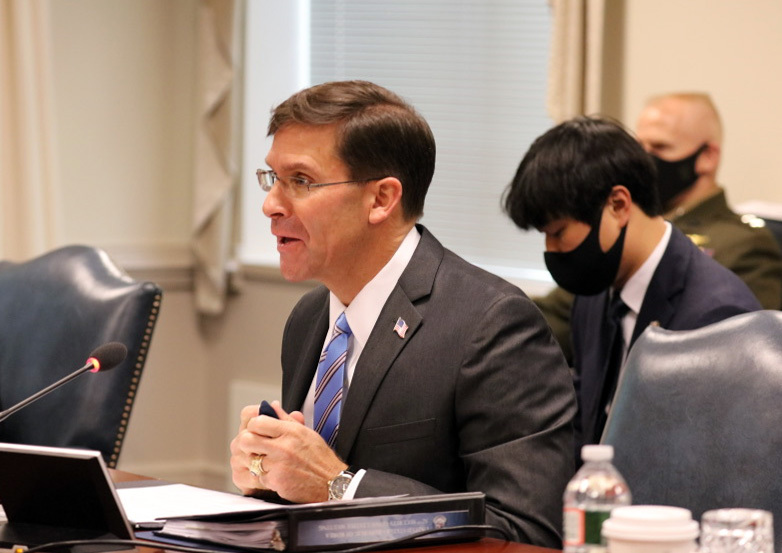Esper says US continues to face threats from N. Korea, other rogue states
By YonhapPublished : Oct. 21, 2020 - 09:07

WASHINGTON -- The United States continues to face ongoing threats from rogue states such as North Korea, US.
Secretary of Defense Mark Esper said Tuesday, highlighting the need to further enhance his country's alliances and defense capabilities.
"Since my confirmation as secretary of defense well over a year ago, my No. 1 priority has been implementing the national defense strategy (NDS). The NDS tells us that we are now in an era of great power competition, with our primary competitors being China and Russia," the US defense chief said in a webinar hosted by a Washington-based think tank, the Atlantic Council.
"At the same time, we face ongoing threats from rogue states, such as North Korea and Iran. Finally, regrettably, we'll be dealing with violent extremist organizations for years to come," he added.
It marks the first time in months that the US defense chief has referred to North Korea as a rogue nation, a term that angers the communist state, nearly without fail.
Publicly, Esper last referred to Pyongyang as a rogue nation in August.
North Korea has maintained and continues to maintain a self-imposed moratorium on nuclear and long-range missile tests since November 2017, but its leader, Kim Jong-un, has said he no longer feel bound by such restrictions.
Esper's use of the term against North Korea comes after the communist state unveiled a new, longer-range intercontinental ballistic missile at its recent military parade marking the 75th anniversary of the founding of its ruling Workers' Party on Oct. 10.
His remarks also come amid stalled negotiations between Washington and Pyongyang on denuclearizing the Korean Peninsula.
US President Donald Trump has held three meetings with North Korean leader Kim Jong-un, including two bilateral summits held June 2018 and February 2019 in Singapore and Hanoi, respectively.
Their talks, however, have stalled since their second summit ended without a deal.
Turning to what the US calls growing competition from China and Russia, Esper called on US allies to share a greater burden in ensuring their common goal of security.
"We also expect them to be ready, capable and willing to deploy when trouble calls. We expect them to stand shoulder to shoulder with the United States in confronting Chinese bad behavior and Russian aggression," he said.
"To overcome the increasingly complex threats in the 21st century and defend our shared values, there can be no free riders in our common security," added the US defense secretary.
His remarks mostly dealt with the US' NATO allies, but they come amid a deadlock in burden-sharing negotiations between South Korea and the United States.
Seoul has offered to increase its burden-sharing in maintaining some 28,500 US troops in South Korea by up to 13 percent from the $870 million it paid under last year's agreement.
The US, on the other hand, is said to be demanding a 50 percent spike to $1.3 billion per year.
Esper noted the US has been asking its NATO allies to boost their defense spending to 2 percent of their gross domestic product as part of their burden-sharing efforts.
South Korea spent over 46 trillion ($40.4 billion) in defense spending in 2019, the 10th largest amount in the world that accounted for 2.6 percent of its GDP. (Yonhap)
Secretary of Defense Mark Esper said Tuesday, highlighting the need to further enhance his country's alliances and defense capabilities.
"Since my confirmation as secretary of defense well over a year ago, my No. 1 priority has been implementing the national defense strategy (NDS). The NDS tells us that we are now in an era of great power competition, with our primary competitors being China and Russia," the US defense chief said in a webinar hosted by a Washington-based think tank, the Atlantic Council.
"At the same time, we face ongoing threats from rogue states, such as North Korea and Iran. Finally, regrettably, we'll be dealing with violent extremist organizations for years to come," he added.
It marks the first time in months that the US defense chief has referred to North Korea as a rogue nation, a term that angers the communist state, nearly without fail.
Publicly, Esper last referred to Pyongyang as a rogue nation in August.
North Korea has maintained and continues to maintain a self-imposed moratorium on nuclear and long-range missile tests since November 2017, but its leader, Kim Jong-un, has said he no longer feel bound by such restrictions.
Esper's use of the term against North Korea comes after the communist state unveiled a new, longer-range intercontinental ballistic missile at its recent military parade marking the 75th anniversary of the founding of its ruling Workers' Party on Oct. 10.
His remarks also come amid stalled negotiations between Washington and Pyongyang on denuclearizing the Korean Peninsula.
US President Donald Trump has held three meetings with North Korean leader Kim Jong-un, including two bilateral summits held June 2018 and February 2019 in Singapore and Hanoi, respectively.
Their talks, however, have stalled since their second summit ended without a deal.
Turning to what the US calls growing competition from China and Russia, Esper called on US allies to share a greater burden in ensuring their common goal of security.
"We also expect them to be ready, capable and willing to deploy when trouble calls. We expect them to stand shoulder to shoulder with the United States in confronting Chinese bad behavior and Russian aggression," he said.
"To overcome the increasingly complex threats in the 21st century and defend our shared values, there can be no free riders in our common security," added the US defense secretary.
His remarks mostly dealt with the US' NATO allies, but they come amid a deadlock in burden-sharing negotiations between South Korea and the United States.
Seoul has offered to increase its burden-sharing in maintaining some 28,500 US troops in South Korea by up to 13 percent from the $870 million it paid under last year's agreement.
The US, on the other hand, is said to be demanding a 50 percent spike to $1.3 billion per year.
Esper noted the US has been asking its NATO allies to boost their defense spending to 2 percent of their gross domestic product as part of their burden-sharing efforts.
South Korea spent over 46 trillion ($40.4 billion) in defense spending in 2019, the 10th largest amount in the world that accounted for 2.6 percent of its GDP. (Yonhap)









![[Kim Seong-kon] Democracy and the future of South Korea](http://res.heraldm.com/phpwas/restmb_idxmake.php?idx=644&simg=/content/image/2024/04/16/20240416050802_0.jpg&u=)










![[Today’s K-pop] Zico drops snippet of collaboration with Jennie](http://res.heraldm.com/phpwas/restmb_idxmake.php?idx=642&simg=/content/image/2024/04/18/20240418050702_0.jpg&u=)